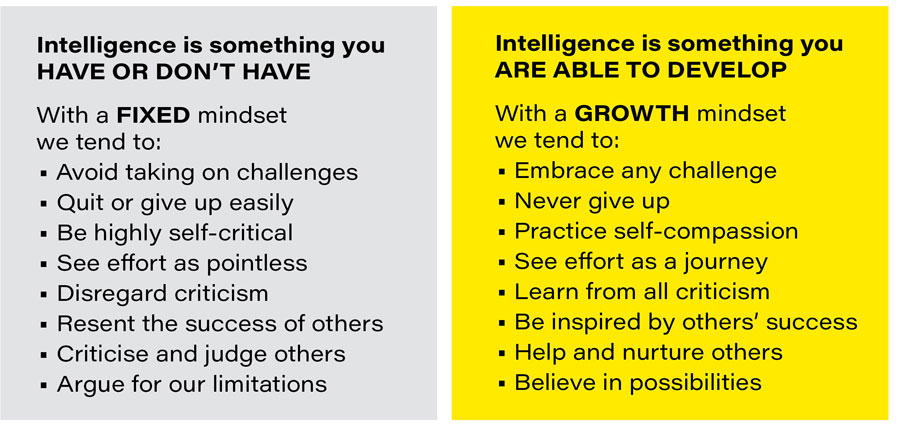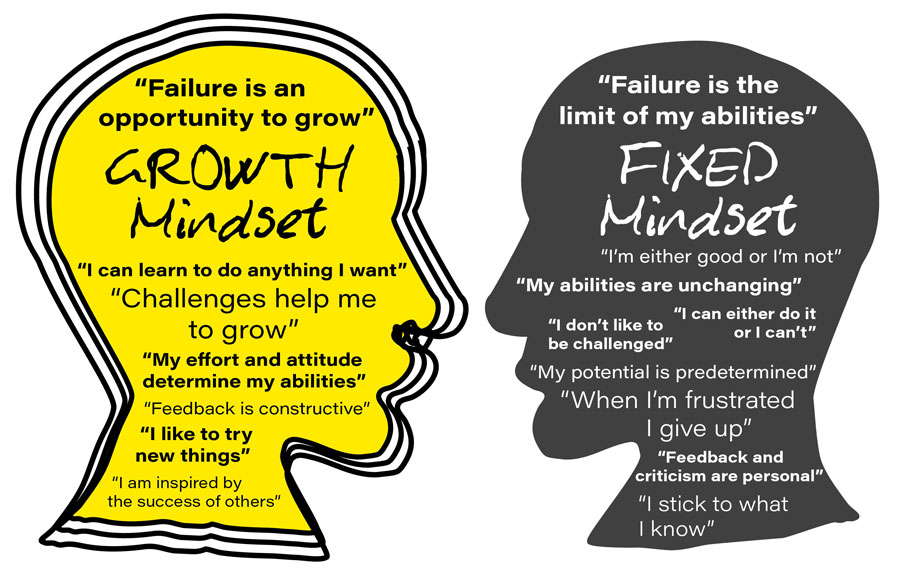Reaching your potential – Fixed vs Growth Mindset
The term Mindset has been around for a while. Developing a healthy attitude towards yourself and your life is not a new concept, but what does having a good mindset actually mean?
Carol S Dweck’s international bestseller ‘Mindset’ is a powerful inquiry into the power of both our conscious and unconscious beliefs. Dweck, a Stamford University Psychologist found in her research some of the most basic beliefs we carry about ourselves has to do with how we view our personality – how we view our traits and characteristics in either a fixed or growth ‘mindset’.
Fixed mindset people believe their qualities are fixed traits. It assumes that character, intelligence and creative ability are strategic givens that cannot be changed in a meaningful way. This mindset believes you are born with a finite amount of intelligence and talent, rather than being able to work and develop these characteristics. Inherent talent alone leads to success, and effort is not only not required, but frowned upon.
Alternatively, in a growth mindset, people have an underlying belief that their learning and intelligence can grow with time and experience. This mindset thrives on challenges and sees failure not as evidence of unintelligence, but an opportunity for growth.
We manifest these mindsets from a very early age, they are largely responsible for our behaviors, and our relationship with success and failure. Dweck writes:
For twenty years, my research has shown that the view you adopt for yourself profoundly affects the way you lead your life. It can determine whether you become the person you want to be and whether you accomplish the things you value. How does this happen? How can a simple belief have the power to transform your psychology and as a result your life?
Believing your qualities are carved in stone – the fixed mindset – creates an urgency to prove yourself over and over. If you only have a certain amount of intelligence, a certain personality and a certain moral character – well, then you’d better prove that you have a healthy dose of them. It simply wouldn’t do to look or feel deficient in these most basic characteristics.
I’ve seen so many people with this one consuming goal of proving themselves, in the classroom, in their careers and in their relationships. Every situation calls for a confirmation of their intelligence, personality or character. Every situation is evaluated. Will I succeed or fail. Will I look smart or dumb. Will I be accepted or rejected. Will I feel like a winner or a loser?
There is another mindset in which these traits are not simply a hand your dealt and have to live with, always trying to convince yourself and others that you have a royal flush when you’re secretly worried it’s a pair of tens. In this mindset, the hand you’re dealt is just the starting point for development. This growth mindset is based on the belief that your basic qualities are things you can cultivate through your efforts. Although people may differ in every which way – in their initial talents and aptitudes, interests or temperaments – everyone can change and grow through application and experience.
Do people with this mindset believe that anyone can be anything, that anyone with proper motivation or education can become Einstein or Beethoven? No but they believe that a persons true potential is unknown (and unknowable) that it is impossible to foresee what can be accomplished with years of passion, toil and training.
Fixed VS Growth MindseT

Mindset and achieving your potential
It is possible to have a combination of both mindsets. If you identify with the fixed mindset, your beliefs may hold you back from making positive change, if you avoid situations that make you feel uncomfortable or tasks you feel you’re not ‘good’ at.
When we live in the fixed mindset, we stop our selves from being able to develop or grow. We look at set backs and challenges as proof that we are ‘not talented enough to suceed’. When we change the way we view our experiences, traits and abilities, with the growth mindset, one in which we are constantly able to improve, we adopt an attitude where challenges and supposed failures provide us with an opporutnity to grow and develop.
Famous growth mindset adopters include Michael Jordon, who famously said ‘Obstacles don’t have to stop you. If you run into a wall, don’t turn around and give up. Figure out how to climb it, go through it, or work around it.’
Try to adopt the traits of the growth mindset, and remember your greater sense of purpose – keep your end goal in mind and an eye on the bigger picture.

